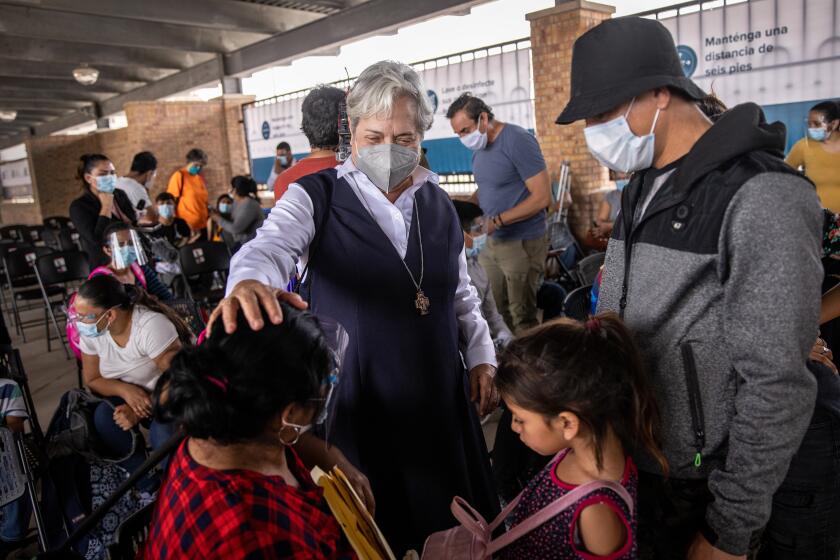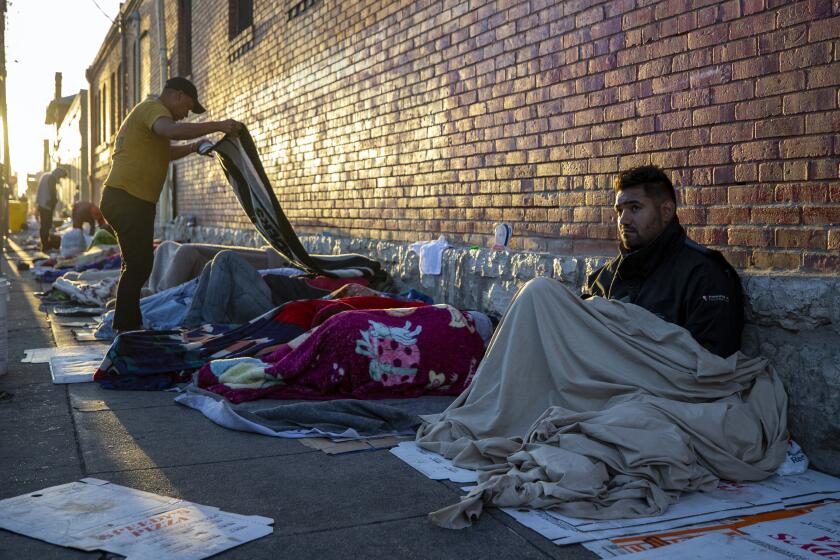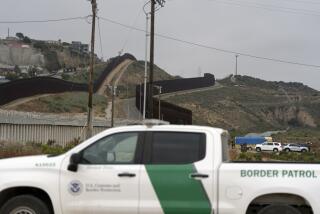Texas is using disaster declarations to install buoys and razor wire on Mexican border

EAGLE PASS, Texas — Wrecking-ball-sized buoys on the Rio Grande. Razor wire strung across private property without permission. Bulldozers changing the very terrain of America’s southern border.
For more than two years, Texas Gov. Greg Abbott has escalated measures to keep migrants from entering the U.S., pushing legal boundaries with a go-it-alone bravado along the state’s 1,200-mile border with Mexico. Now blowback over the Republican’s tactics is widening, including from within Texas.
A state trooper’s account of officers denying migrants water in 100-degree Fahrenheit temperatures and razor wire leaving asylum-seekers bloodied has prompted renewed criticism. The Mexican government, residents and the Biden administration are pushing back, with the U.S. Justice Department threatening to sue Texas unless steps are taken Monday to begin removing the floating barrier.
Abbott, who cruised to a third term in November while promising tougher border crackdowns, has used disaster declarations as the legal bedrock for some measures.
Critics call that a warped view.
“There are so many ways that what Texas is doing right now is just flagrantly illegal,” said David Donatti, an attorney for the Texas American Civil Liberties Union.
Abbott did not respond to requests for comment. He has repeatedly attacked President Biden’s border policies, tweeting Friday that they “encourage migrants to risk their lives crossing illegally through the Rio Grande, instead of safely and legally over a bridge.”
The Biden administration has said illegal border crossings have declined significantly since new immigration rules took effect in May.
The reported incidents have coincided with Texas Gov. Greg Abbott’s push for intense border security efforts through his Operation Lone Star initiative.
Altered border
Under the international bridge connecting Eagle Pass, Texas, with Piedras Negras, Mexico, protesters gathered at Shelby Park this month, chanting “save the river” and blowing a conch shell in a ceremony. A few yards away, crews unloaded neon-orange buoys from trailers parked by a boat ramp off the Rio Grande.
Jessie Fuentes stood with the environmental advocates, watching as state troopers restricted access to the water where he holds an annual kayak race. Shipping containers and layers of concertina wire lined the riverbank.
The experienced kayaker often took clients and race participants into the water through a shallow channel formed by a border island covered in verdant brush. That has been replaced by a bulldozed stretch of barren land connected to the mainland and fortified with razor wire.
Sister Norma Pimentel, a nun famous for her compassion toward migrants, said that parties on both sides of the aisle turned the bus carrying migrants from Texas to L.A. into a spectacle.
“The river is a federally protected river by so many federal agencies, and I just don’t know how it happened,” Fuentes told the Eagle Pass City Council the night before.
Neither did the City Council.
“I feel like the state government has kind of bypassed local government in a lot of different ways. And so I felt powerless at times,” council member Elias Diaz told the Associated Press.
The International Boundary of Water Commission says it was not notified when Texas modified several islands or deployed the massive buoys to create a barrier covering 1,000 feet of the middle of the Rio Grande, with anchors in the riverbed.
The Justice Department has warned Texas that the buoy wall is unlawful and the Biden administration will sue if the state doesn’t remove it. Abbott tweeted Friday that the state “has the sovereign authority to defend our border” after the Justice Department sought a commitment by Monday afternoon to remove the barrier.
The floating barrier also provoked tension with Mexico, which says it violates treaties. Mexico’s secretary of foreign relations asked the U.S. government to remove the buoys and razor wire in a June letter.
Fuentes sued over the buoys, arguing that border crossings are not covered by the Texas Disaster Act.
Migrants in Texas say contractors working for Florida Gov. Ron DeSantis pushed them to board flights to California, promising shelter and immigration aid.
As for the river islands, the Texas General Land Office gave the state Department of Public Safety access starting in April “to curb the ongoing border crisis.”
“Additionally, the General Land Office will also permit vegetation management, provided compliance with all applicable state and federal regulations is upheld,” said a letter from the office’s commissioner, Dawn Buckingham.
The Texas Military Department cleared out carrizo cane, which Buckingham’s office called an “invasive plant” in its response to questions from the AP, and changed the landscape, affecting the river’s flow.
Environmental experts are concerned.
“As far as I know, if there’s flooding in the river, it’s much more severe in Piedras Negras than it is in Eagle Pass because that’s the lower side of the river. And so next time the river really gets up, it’s going to push a lot of water over on the Mexican side, it looks like to me,” said Tom Vaughan, a retired professor and co-founder of the Rio Grande International Study Center.
Fuentes recently sought special permission from the city and DPS to navigate through his familiar kayaking route.
“Since they rerouted the water on the island, the water is flowing differently,” Fuentes said. “I can feel it.”
The state declined to release any records that might detail the environmental impacts of the buoys or changes to the landscape.
Victor Escalon, a state Department of Public Safety regional director overseeing Del Rio down to Brownsville, pointed to the governor’s emergency disaster declaration. “We do everything we can to prevent crime, period. And that’s the job,” he added.
Trespassing to stop trespassers
For one property owner, the Department of Public Safety mission cut him out of his land.
In 2021, as Eagle Pass became the preferred route by migrants crossing into the U.S., Magali and Hugo Urbina bought a pecan orchard by the river that they called Heavenly Farms.
Hugo Urbina worked with DPS when the agency built a fence on his property and arrested migrants for trespassing. But the relationship turned acrimonious a year later after DPS asked to put up concertina wire on riverfront property that the Urbinas were leasing to the U.S. Border Patrol to process immigrants.
More than 21,600 migrants have been transported across the country from Texas, under a plan hastily instituted by Gov. Greg Abbott last year. Forty-two arrived in L.A. last week.
Hugo Urbina wanted the Department of Public Safety to sign a lease that would shield him from liability if the wire caused injuries. DPS declined but still installed concertina wire, moved vehicles onto the property and shut the Urbinas’ gates. That cut off the Border Patrol’s access to the river, though it still leases land from Urbina.
“They do whatever it is that they want,” Urbina said this month.
The farmer, a Republican, calls it “poison politics.” Critics call it déjà vu.
“I also really see a very strong correlation to the Trump and post-Trump era in which most of the Trump administration’s immigration policy was aggressive and extreme and very violative of people’s rights, and very focused on making the political point,” said Aron Thorn, an attorney with the Texas Civil Rights Project. “The design of this is the optics and the amount of things that they sacrifice for those optics now is quite extraordinary.”
The state Department of Public Safety works with 300 landowners, according to Escalon. He said it is unusual for the department to take over a property without the landowner’s consent, but the agency says the Disaster Act provides the authority.
Urbina said he supports the governor’s efforts, “but not in this way.”
“You don’t go out there and start breaking the law and start making your citizens feel like they’re second-hand citizens,” he added.
More to Read
Sign up for Essential California
The most important California stories and recommendations in your inbox every morning.
You may occasionally receive promotional content from the Los Angeles Times.













